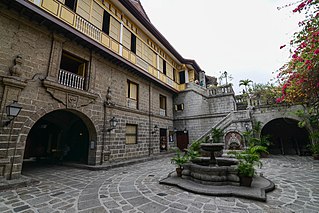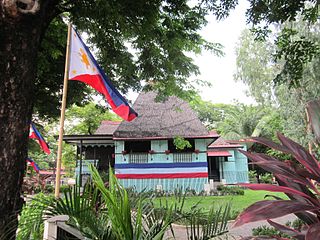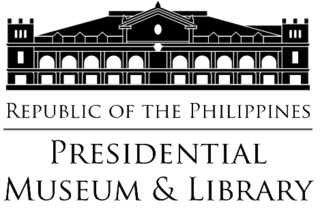 W
WThe Nakpil-Bautista House is one of the old houses found in the district of Quiapo, Manila. It was built in 1914 by Arcadio Arellano. The two-house originally sits on two lots, having a total area of 500 square meters. The National Historical Commission of the Philippines declared the house as a cultural property on August 25, 2011. Today, the house is a museum showcasing items of the Katipunan, paintings, among others.
 W
WCasa Manila is a museum in Intramuros depicting colonial lifestyle during Spanish colonization of the Philippines.
 W
WThe Iglesia ni Cristo Museum is a museum in Punta, Santa Ana, Manila. The building of the museum was originally used as a place of worship and is the first local congregation of the Iglesia ni Cristo and is now used as a museum by the church. It is the location where founder Felix Manalo first preached about the Iglesia in 1914.
 W
WThe Mabini Shrine is a historic site in Santa Mesa, Manila, Philippines. It is the original house owned by the del Rosario family in Pandacan to whom Apolinario Mabini, known as "the Sublime Paralytic" and "the Brains of the Philippine Revolution", was related by affinity. On May 13, 1903, Mabini died of cholera at the age of 39 in this house. The shrine is now located within the main campus of the Polytechnic University of the Philippines in Santa Mesa, after several relocations. It is situated next to the newly-constructed Museo ni Apolinario Mabini, where some of his belongings and memorabilia can be found. The Mabini Shrine is a government recognized National Shrine and cultural property based on the official lists provided by the National Commission on Culture and the Arts, National Historical Commission of the Philippines and the National Museum of the Philippines.
 W
WMalacañang Palace, officially known as Malacañan Palace, is the official residence and principal workplace of the president of the Philippines. It is located in the Manila district of San Miguel, and is commonly associated with Mendiola Street. The term Malacañang is often used as a metonym for the president and his advisers. The sprawling Malacañang Palace complex includes numerous mansions and office buildings designed and built largely in bahay na bato and neoclassical style. Among the presidents of the present Fifth Republic, only Gloria Macapagal Arroyo actually lived in the main palace as both office and her residence, with all others residing in nearby properties that form part of the larger palace complex. The palace has been seized several times as a result of protests starting with the People Power Revolution of 1986, the 1989 coup attempt, the 2001 Manila riots, and the EDSA III riots.
 W
WThe Metropolitan Museum of Manila is one of the major museums in the city located within the Bangko Sentral ng Pilipinas (BSP) Complex along Roxas Boulevard in the Malate district of Manila, the Philippines. It bills itself as the country's premier museum for modern and contemporary visual arts by local and international artists.
 W
WMuseo de Intramuros is an ecclesiastical museum operated and managed by the Intramuros Administration. It is located at the reconstructed San Ignacio Church and Convent within the historic walled area of Intramuros in Manila, Philippines.
 W
WThe Museo Pambata is a children's museum in the Ermita district of Manila, near Rizal Park, in the Philippines. It is located in the former Elks Club Building, built in 1910, along Roxas Boulevard at the corner of South Drive.
 W
WThe National Museum of Anthropology, formerly known as the Museum of the Filipino People, is a component museum of the National Museum of the Philippines which houses Ethnological and Archaeological exhibitions. It is located in the Agrifina Circle, Rizal Park, Manila adjacent to the National Museum of Fine Arts building.
 W
WThe National Museum of Fine Arts, formerly known as the National Art Gallery, is an art museum in Manila, Philippines. It is located on Padre Burgos Avenue across from the National Museum of Anthropology in the eastern side of Rizal Park. The museum, owned and operated by the National Museum of the Philippines, was founded in 1998 and houses a collection of paintings and sculptures by classical Filipino artists such as Juan Luna, Félix Resurrección Hidalgo and Guillermo Tolentino.
 W
WThe National Planetarium, also known as the National Museum Planetarium, was a planetarium owned and operated by the National Museum of the Philippines in Manila. It is a 16-metre (52 ft) dome located in Rizal Park between the Japanese Garden and Chinese Garden on Padre Burgos Avenue in the central district of Ermita. It opened on October 8, 1975, and has been in operation since then.
 W
WThe National Museum of Natural History is the national natural history museum of the Philippines. It is located along Agrifina Circle in Rizal Park, Manila.
 W
WThe Presidential Museum and Library, formerly the Malacañang Museum, is a museum and library institution of the Philippine government. An agency under the Office of the President, it is tasked responsible for preserving, managing, and promoting the history and heritage of the Philippine Presidency as well as the Malacañang Palace.
 W
WThe University of the Philippines Manila Museum of a History of Ideas is a university museum located in Ermita, Manila, Philippines.
 W
WThe University of Santo Tomas Museum of Arts and Sciences is the oldest existing museum in the Philippines. It started as a Gabinete de Fisica, or observation room, of mineral, botanical and biological collections in the 17th century. Under the old Spanish educational law the collections were used as classroom materials, especially in Medicine and Pharmacy.